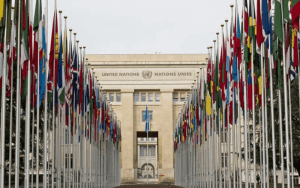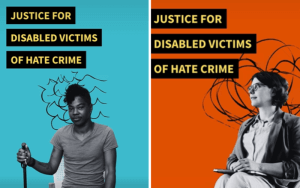Disabled activists are to hold a day of action in Westminster – and online – next month in protest at the government’s refusal to engage with the “deep-rooted concerns” of autistic people and people with learning difficulties about the mental health bill.
They plan to march on the Department of Health and Social Care (DHSC) to hand in a letter asking for a meeting with a minister to discuss the bill’s flaws.
They say the mental health bill – which is currently approaching the end of its passage through the House of Lords, before moving to the Commons – will not prevent autistic people and people with learning difficulties from being locked up in mental health hospitals just because they are disabled.
The day of action on 29 April is being organised by the Bring People Home from Hospital campaign, supported by Inclusion London.
Among the disabled people’s groups and organisations that are part of the campaign are Free Our People Now – backed by Inclusion London – All Wales People First; People First (Scotland); My Life My Choice; First Do No Harm; the National Autistic Taskforce; and People First (Self-Advocacy).
Free Our People Now (FOPN) was among the user-led campaign groups that gave evidence about the bill last week at a roundtable session organised by the parliamentary joint committee on human rights, which is carrying out scrutiny of the bill to “assess its compatibility with international and domestic human rights standards”.
FOPN says there has been a “lack of engagement” with people with learning difficulties and autistic people from the government, including those working on the mental health bill within DHSC.
Simone Aspis (pictured), founder of FOPN, which is led by people with learning difficulties and autistic people, said there was “no evidence whatsoever” of government engagement.
Without that engagement, she said, the bill would not “move people out of hospitals and into their own homes”, and it would not guarantee people “decent lives”.
It would also fail to address concerns about the bill’s failure to protect people from being abused in the psychiatric system, she said.
Concerns about the bill were also raised by FOPN in written evidence to the committee.
A key concern is that the bill does not stop autistic people and people with learning difficulties from being locked up because of non-criminal behaviour, which FOPN says is a breach of article 12 of the UN Convention on the Rights of Persons with Disabilities.
FOPN’s written evidence to the committee also raises concerns that the bill will fail to protect autistic people and people with learning difficulties from discrimination if they are also people of colour, women, from LGBT+ communities, or from other marginalised communities.
And it says the bill will not stop them being locked up without doing anything wrong, without a court case and without their agreement.
FOPN told the committee that one autistic person had said: “I was detained under the mental health act for almost three-and-a-half years.
“I spent time in various psychiatric hospitals and an assessment and treatment unit.
“The reason I was there was because I am autistic and other people, who were not experts in autism, decided I should not be allowed to leave.”
FOPN says the government has ignored criticisms of the UK made by the UN’s committee on the rights of persons with disabilities in 2017 on these and other concerns, including the use of force on people in detention, and policies to stop abuse and other inhumane and degrading treatment.
FOPN says in its written evidence that everyone “should have the same right to freedom”, and the bill will not guarantee this.
The bill’s report stage in the Lords is due to begin on 31 March, with the bill set to be debated in the Commons soon after the Easter break.
But Aspis said: “As far as I am concerned, it is never too late for the government to realise if they really want to improve the mental health bill, they need to engage with our communities.
“That should have been done from the beginning.”
The Department of Health and Social Care had not responded by noon today (Thursday) to the concerns about its lack of engagement on the bill.
A note from the editor:
Please consider making a voluntary financial contribution to support the work of DNS and allow it to continue producing independent, carefully-researched news stories that focus on the lives and rights of disabled people and their user-led organisations.
Please do not contribute if you cannot afford to do so, and please note that DNS is not a charity. It is run and owned by disabled journalist John Pring and has been from its launch in April 2009.
Thank you for anything you can do to support the work of DNS…

 ‘Dismay’ at ‘discriminatory’ actions of DWP ministers, in third letter from UN experts to UK in just two months
‘Dismay’ at ‘discriminatory’ actions of DWP ministers, in third letter from UN experts to UK in just two months Racist responses to disability hate crime campaign signal ‘deeply worrying’ trend
Racist responses to disability hate crime campaign signal ‘deeply worrying’ trend Ofcom ‘is normalising abuse’ by failing to probe GB News guest who said disabled people should be starved
Ofcom ‘is normalising abuse’ by failing to probe GB News guest who said disabled people should be starved